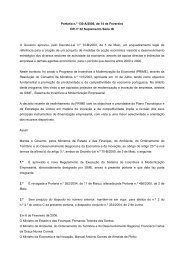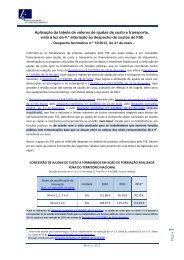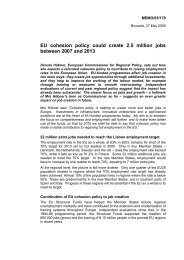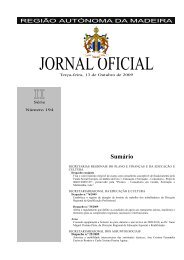Industrial Relations in Europe 2012 - European Commission - Europa
Industrial Relations in Europe 2012 - European Commission - Europa
Industrial Relations in Europe 2012 - European Commission - Europa
You also want an ePaper? Increase the reach of your titles
YUMPU automatically turns print PDFs into web optimized ePapers that Google loves.
decision affects <strong>in</strong> a uniform way all six million public functionaries. It is hard to f<strong>in</strong>d <strong>in</strong> <strong>Europe</strong> an<br />
equally centralised system, either <strong>in</strong> the public or the private sector. The above-mentioned recent<br />
law on the renewal of social dialogue <strong>in</strong> the public sector may have effects on the representative<br />
trade unions which are admitted to negotiations and on the number of matters that can be negotiated<br />
(Tissandier 2011), but not on the extreme centralisation of the system of pay determ<strong>in</strong>ation. Forms<br />
of performance-related pay and <strong>in</strong>dividualisation of terms and conditions have been <strong>in</strong>troduced <strong>in</strong><br />
recent years, <strong>in</strong>itially for functionaries of the higher grades, and then partially extended to the lower<br />
grades. On the whole, however, this does not seem so far to have significantly altered the<br />
traditionally uniform HRM practices that characterise French public bureaucracy.<br />
The German wage sett<strong>in</strong>g system used to be almost as centralised as the French system, despite the<br />
federal constitutional structure of the state. Centralisation was granted by a unitary barga<strong>in</strong><strong>in</strong>g<br />
coalition on the employers’ side, cover<strong>in</strong>g all three levels of government – federal level (Bund),<br />
federal states (Länder) and municipalities -, led by the M<strong>in</strong>istry of the Interior. Thus, <strong>in</strong> the German<br />
case also, only one collective agreement cover<strong>in</strong>g a major barga<strong>in</strong><strong>in</strong>g unit used to set pay and<br />
work<strong>in</strong>g conditions for all public employees. The substantive components of the agreements were<br />
usually transferred to civil servants by formal decisions of the Federal Parliament. Thus, despite<br />
different forms of employment and <strong>in</strong>terest representation, changes to work<strong>in</strong>g conditions were<br />
basically the same for all public employees, civil servants <strong>in</strong>cluded (Keller 2011: 2344). Recently,<br />
however, two factors have partially altered this highly centralised structure. First, <strong>in</strong> 2003 the<br />
Barga<strong>in</strong><strong>in</strong>g Association of German states (TdL) left the unitary barga<strong>in</strong><strong>in</strong>g coalition and started<br />
<strong>in</strong>dependent negotiations, conclud<strong>in</strong>g <strong>in</strong> 2006 an important separate agreement with state-specific<br />
arrangements. Second, a break up also occurred with<strong>in</strong> the Barga<strong>in</strong><strong>in</strong>g Association at the state level,<br />
with the exit of the state of Berl<strong>in</strong> and the state of Hesse, which started a form of s<strong>in</strong>gle employer<br />
barga<strong>in</strong><strong>in</strong>g. So, <strong>in</strong> a short period of time, changes <strong>in</strong> horizontal and vertical <strong>in</strong>tegration altered the<br />
highly centralised barga<strong>in</strong><strong>in</strong>g structures that characterised the German system, with its uniform and<br />
standardised employment conditions (Keller 2011). It rema<strong>in</strong>s to be seen whether these<br />
developments are isolated events or signal more structural transformations. The economic crisis<br />
seems to re<strong>in</strong>force this trend towards a greater differentiation. This is also pursued through a wider<br />
use of the regulatory powers of public employers to first unilaterally enforce changes <strong>in</strong> pay and<br />
work<strong>in</strong>g conditions of civil servants, and then to attempt to extend them via collective barga<strong>in</strong><strong>in</strong>g<br />
to other public employees. Greater decentralisation and differentiation via stronger unilateralism<br />
seem to be the effects of the crisis on German public sector employment relations.<br />
Connected to, but analytically dist<strong>in</strong>ct from, decentralisation trends are processes of differentiation<br />
and even <strong>in</strong>dividualisation of pay and terms and conditions. This has occurred <strong>in</strong> most countries<br />
under programmes of modernisation of public adm<strong>in</strong>istrations, <strong>in</strong>spired to a greater or lesser extent<br />
by the NPM doctr<strong>in</strong>e. However, there is great variation across countries with regard to the extent to<br />
which these measures, <strong>in</strong> form of performance-related pay (PRP) or similar mechanisms, have been<br />
implemented, especially among non-managerial staff (Bach and Bordogna 2011). They are more<br />
diffused among managers and senior civil servants, although the <strong>in</strong>cidence of pay l<strong>in</strong>ked to<br />
performance should not be emphasised 39 . These trends towards the differentiation of terms and<br />
conditions have not been halted, <strong>in</strong> pr<strong>in</strong>ciple, by the recent economic crisis; rather, the scarcity of<br />
resources has often created obstacles to their practical implementation - recent developments l<strong>in</strong>ked<br />
to part of the 2009 reform <strong>in</strong> Italy is a case <strong>in</strong> po<strong>in</strong>t (Peders<strong>in</strong>i 2010b).<br />
39 Accord<strong>in</strong>g to a OECD study on performance-based arrangements for senior civil servants (<strong>in</strong>clud<strong>in</strong>g Germany, Italy,<br />
Netherlands, Ireland, Spa<strong>in</strong> and Sweden among other OECD countries), this component is never higher than 8%,<br />
and <strong>in</strong> several cases significantly lower (OECD 2007: Table 5).<br />
149

















